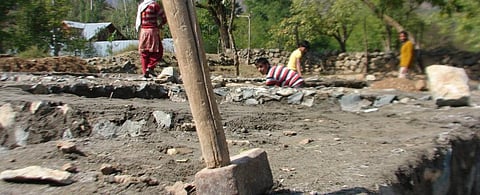

Union Budget 2020-21 will be a landmark for Prime Minister Narendra Modi. Not just because India is going through an economic slowdown, but also for the fact that it will herald a countdown for many of his ambitious promises that come with prime ministerial deadlines.
Let’s look at a few such and their deadlines. By 2022, he has promised to double farmers’ income. This budget is effectively the last fiscal opportunity to show where we stand on this, and how the government would support achieving this target. This is the year when he promised a not-yet-defined ‘New India’.
Just before the presentation of the last full budget, he promised piped water to all by 2024 and electricity to all by 2022. For the promise of piped water, the Budget 2020-21 will have to show the required government support to achieve it.
Overall, while India’s economic growth is the slowest in more than five years, the new budget will emerge as a test for Modi’s perceived daredevil image of a deliverer of promises.
How is the preparation for the budget towards achieving these promises? In just over a week, the budget has to be finalised for printing under heavy security. Officials working on the preparations have just one common off-the-record comment: “Wait for a headlines-dominated budget”.
This means the budget will have many declarations; many provisions; but very less in term of real fund allocations.
“At best, it will be a budget with 10-15 per cent more financial allocations than the last one,” says a senior NITI Aayog member involved in prioritising allocations for the upcoming budget.
Given the financial constrains, it is certain that the budget would see rationalisation of many rural development schemes. As sources point out, two big changes may be expected from the budget. “The Mahatma Gandhi National Rural Employment Guarantee Act will emerge as the ‘only’ effective and functional rural development programme,” says an official of the Union finance ministry.
During the phase of the Finance Ministry asking various ministries on fund demands and priority schemes, a stern advise was to see how many rural development schemes could be brought under or be funded using the budget for Mahatma Gandhi National Rural Employment Guarantee (MGNREGA) Act. Many bureaucrats interpret this as an indication that MGNREGA would be used as a funder for most activities for rural development.
Being a demand-driven scheme backed by a parliamentary Act, the government can’t tinker with it. But it also has high budgetary allocations. “The rationalisation process may bring in more works under its ambit, thus weeding out small and ineffective schemes. This will make it the only effective rural development scheme in the country,” the official says. MGNREGA is expected tp be allocated more than Rs 75,000 crore.
Before budget preparations, the government is already working on the modalities for delivering the promised piped water to all by 2024. The Jal Shakti ministry has been vocal about using MGNREGA to ensure this.
Water supply to all does include water conservation and ensuring water sources at village level. Currently, more than 70 per cent of allowed works under the MGNREGA are related to water conservation. By increasing MGNREGA funds and focusing more on water conservation, the new piped water scheme can be managed without extra budgetary allocation.
The “headline” expected from the budget is on direct monetary support to farmers/poor households. Under the PM-KISAN scheme, the government has already started handing out an annual cash support of Rs 6,000 to farmers. There are ongoing experiments on monetising various subsidies and directly transferring cash to the bank accounts beneficiary’s account.
Going by officials of the agriculture ministry and rounds of discussions at the Prime Minister’s Office, the government is expected to bundle all these subsidies into a single cash transfer to the identified beneficiary. It might just be declared in the budget, heralding the country’s universal income scheme.
As an economist in NITI Aayog says: “A declaration of cash transfer up to Rs 15,000 a year to a farmer’s account certainly makes great headline, even if it doesn’t materialise before 2021.”
A hallmark of Modi has been to declare major schemes/fiscal decisions out of the budget process. As in the past, such decisions have come strategically around major elections. The ruling Bharatiya Janata Party has to fight many such elections in the next two years.
Modi’s re-election in 2019 in credited to his focus on delivering tangible benefits to the “right” beneficiary. Like in the last general elections, he made the 200 million beneficiaries of government schemes such as Swachh Bharat Mission and Ujjwala his main agenda to display commitment to the development of the poor.
The next budget may just repeat this by further targeting the individual beneficiary, and this time with direct cash transfer.